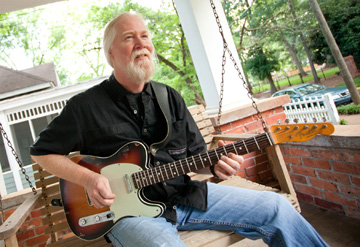The Core: Jimmy Herring

The Widespread Panic guitarist discusses his new album Subject to Change Without Notice and his other celebrated projects as well.
Idea Piles
It had been four years since my last solo record and, during that time, I always had little ideas laying around. But playing in a band is a full-time thing, so there wasn’t a lot of time to write new material for a separate project until [Widespread Panic] decided to take some time off. With the way the market is and the download [trend of people getting music for free], I wasn’t even sure my label wanted me to make another record, but they did. So I started getting busy pulling things together. Some of the tunes came together two days before the studio session. We [also] had a couple of covers that we’d been doing live: Jimmy McGriff’s “Miss Poopie,” George Harrison’s “Within You Without You” and John McLaughlin’s “Hope.” I knew I wanted to work with Jeff Sipe, Neil Fountain and Matt Slocum, the guys who form the core band. [Etienne] Mbappé, the bass player with John McLaughlin’s band, flew in from Poland to play on the session. Béla Fleck and saxophonist Bill Evans ended up recording some things and sending them over.
Keane Ideas
[Panic producer] John Keane agreed to work on this record. This is an instrumental band with a smaller record budget than what he’s usually able to work with. He made it possible for us to afford him and I’m indebted to him. But John gives 100 percent no matter what the situation is. A lot of people don’t know Panic’s records, and if they were in my shoes, they would just listen to live tapes, but I felt like it was important to listen to live tapes and the records [when I joined Panic]. I’ve listened to Ain’t Life Grand, Bombs and Butterflies, ‘Til the Medicine Takes and Don’t Tell the Band on various systems – through headphones, iPods, computer speakers, all the way up to really nice stereos – and those records are so good. I was so blown away by his production.
Family Affairs
My son and I have played together but it’s just not something we do a lot. I don’t want to pressure him. He has similar taste to what I like but he also helped me rediscover James Brown, Steve Gadd, Cornell Dupre and [Igor] Stravinsky. Plus, his sister’s fiancé is Derek Trucks’ little brother [Duane]. When I was his age, I was into Dixie Dregs, Mahavishnu Orchestra and Return To Forever – the instrumental jazz-fusion thing. I got into it mainly because finding singers is just damn near impossible when you’re a kid. I loved Led Zeppelin, Aerosmith, The Beatles, Jimi Hendrix and my brother said, “Man, I know it’s frustrating to you to not be able to find a singer so why don’t you listen to instrumental music and see what you can find with that?”
Hard Rock Attitudes
Playing in Panic has been a tremendous influence on me and so has playing with Phil Lesh and The Dead. That was a nuclear influence on me. It was the beginning of my love for singer/songwriter music. Those guys in Panic play everything from folk-based music to borderline hard rock and have a hard rock attitude in their band. They like big guitar sounds. Mikey Houser had a really massive guitar sound. I didn’t go for anything quite like that on this record but it’s definitely an influence.
Phil’s Friend
I told Phil a long time ago, “Anytime you want to play with the old band, I will be there in a New York minute.” That was one of my favorite musical experiences, playing with those guys, and coming back to it [at Terrapin Crossroads this past spring] was like putting on an old pair of shoes. I think that everybody’s a little bit wiser, a little bit older, a little bit more seasoned and little bit quicker to respond to new music. When I [started] playing with Phil, it was a constant battle for me to keep up with a catalog that was always changing and growing, which I found to be extremely wonderful.
ARU
Every one of us had the time of our lives [during last year’s Aquarium Rescue Unit reunion]. After that show, it made us realize, “This is special, we need to play some more.” But the problem is the logistics. Everybody’s schedules are so different. It’s almost like playing in ARU was put there to prepare me for life. Not just music, either – life in general: touring with a bunch of guys that are that good under tough situations and conditions with no money flying around. We had to tour on our own shoestring and none of us were there for anything more than the music.



















